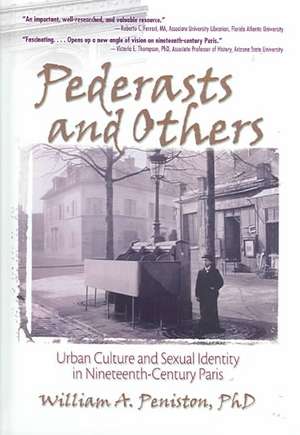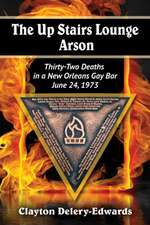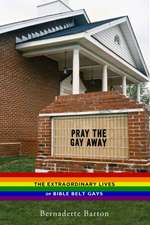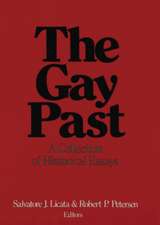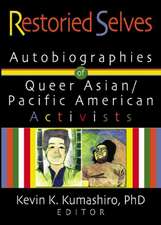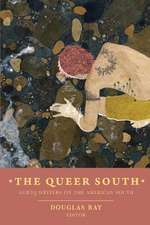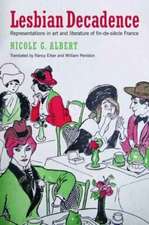Pederasts and Others: Urban Culture and Sexual Identity in Nineteenth-Century Paris
Autor William Penistonen Limba Engleză Hardback – 12 aug 2004
A unique social history, Pederasts and Others: Urban Culture and Sexual Identity in Nineteenth-Century Paris is a valuable addition to the growing field of gay and lesbian studies. The book examines the interaction between the city's male homosexual subculture and Parisian authority figures who attempted to maintain political and social order during the early years of the French Third Republic by using laws against public indecency and sexual assault to treat same-sex sexuality as a crime. Faced with a constant cycle of surveillance, harassment, and arrest, the city's gay men survived the hostile urban environment by forming a community of support that had a widespread and lasting influence on the development of modern sexual identities.
Pederasts and Others: Urban Culture and Sexual Identity in Nineteenth-Century Paris is based on a statistical analysis of more than 800 working-class and middle-class men who were arrested or investigated by Parisian police between 1873 and 1879. Their stories, presented through long and short case studies, represent nearly 2,000 names recorded by police in “Pederasts and Others,” a ledger detailing the arrests of male homosexuals for public offenses against decency and other minor offenses. (The term “pederast” identified those suspected of same-sex sexual activity, not the modern definition that indicates homosexual relations with a minor.) The ledger entries reveal specific habits, attitudes, values, and characteristics about these men that set them apart—the same traits that identified them as part of a community based on their behavior and relationships.
Pederasts and Others: Urban Culture and Sexual Identity in Nineteenth-Century Paris examines:
- the forces of authority
- the laws regarding same-sex sexual behavior
- the role of the police
- the role of the magistrates
- the role of the doctors
- the common characteristics of the city's male homosexual subculture
- the sexual behaviors of the Paris underground
- the geography of the subculture
- “A Decadent Aristocrat and A Delinquent Boy”
- “Pederasts, Prostitutes, and Pickpockets”
- “Love and Death in Gay Paris”
| Toate formatele și edițiile | Preț | Express |
|---|---|---|
| Paperback (1) | 313.40 lei 6-8 săpt. | |
| Taylor & Francis – 4 aug 2004 | 313.40 lei 6-8 săpt. | |
| Hardback (1) | 767.93 lei 6-8 săpt. | |
| Taylor & Francis – 12 aug 2004 | 767.93 lei 6-8 săpt. |
Preț: 767.93 lei
Preț vechi: 1241.57 lei
-38% Nou
Puncte Express: 1152
Preț estimativ în valută:
146.99€ • 159.72$ • 123.55£
146.99€ • 159.72$ • 123.55£
Carte tipărită la comandă
Livrare economică 21 aprilie-05 mai
Preluare comenzi: 021 569.72.76
Specificații
ISBN-13: 9781560234852
ISBN-10: 1560234857
Pagini: 270
Dimensiuni: 152 x 229 x 23 mm
Greutate: 0.66 kg
Ediția:1
Editura: Taylor & Francis
Colecția Routledge
Locul publicării:Oxford, United Kingdom
ISBN-10: 1560234857
Pagini: 270
Dimensiuni: 152 x 229 x 23 mm
Greutate: 0.66 kg
Ediția:1
Editura: Taylor & Francis
Colecția Routledge
Locul publicării:Oxford, United Kingdom
Cuprins
- Acknowledgments
- Introduction
- Part I: The Forces of Authority
- Chapter 1. The Laws
- Chapter 2. The Police
- Chapter 3. The Police in the 1870s
- Chapter 4. The Magistrates
- Chapter 5. The Doctors
- Chapter 6. Summary
- Part II: The Subculture
- Chapter 7. Composition
- Chapter 8. Sexual Behavior
- Chapter 9. Social Relations
- Chapter 10. Geography
- Chapter 11. Summary
- Part III: Case Studies
- Chapter 12. A Decadent Aristocrat and a Delinquent Boy
- Chapter 13. Pederasts, Prostitutes, and Pickpockets
- Chapter 14. Love and Death in Gay Paris
- Chapter 15. Summary
- Conclusion
- Notes
- Bibliography
- Index
Descriere
A unique social history, Pederasts and Others: Urban Culture and Sexual Identity in Nineteenth-Century Paris is a valuable addition to the growing field of gay and lesbian studies. The book (A Choice Magazine Outstanding Academic Title for 2005) examines the interaction between the city's male homosexual subculture and Parisian authority figures who attempted to maintain political and social order during the early years of the French Third Republic by using laws against public indecency and sexual assault to treat same-sex sexuality as a crime. Faced with a constant cycle of surveillance, harassment, and arrest, the city's gay men survived the hostile urban environment by forming a community of support that had a widespread and lasting influence on the development of modern sexual identities.
